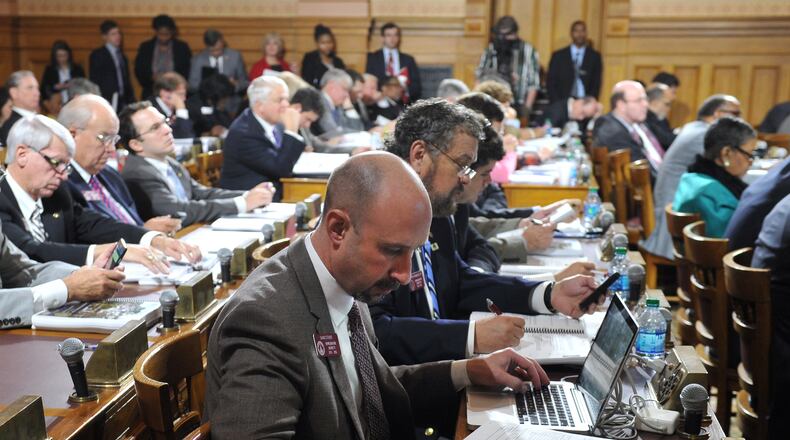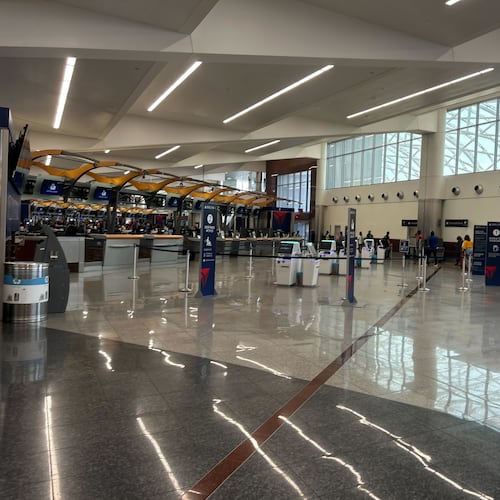Gov. Nathan Deal proposed a $26 billion spending plan Thursday that is light on pay raises and new initiatives and heavy on construction projects.
But it might change — in a big way — by late March.
That’s because Deal and lawmakers have a lot of unanswered questions, thanks in part to Congress.
Because of the December tax plan, Deal doesn’t know for sure how much revenue the state will collect to fund his budget because federal changes could mean Georgia will take in less money.
Because Congress has not approved a long-term renewal of the federally funded health insurance program for children, and still might cut Medicaid and other public health programs, the state doesn't know whether it will be receiving hundreds of millions of dollars less in federal funding.
And then there's the possibility, at some point, that Amazon will pick Atlanta as a finalist to be home to the company's second headquarters, and the state will suddenly have to come up with a pricey incentive package.
So Deal and lawmakers start the 2018 session less certain than in most years about where the state will stand financially come spring.
“It will be very fluid,” predicted Chris Riley, the governor’s chief of staff.
Riley said the Deal administration hopes to have some kind of idea fairly soon about how much less money the state of Georgia would take in because of the federal tax law, which will cut taxes for millions of individuals and businesses.
Deal and lawmakers may try to adjust the state tax code so that the federal law doesn’t have a big impact on Georgia finances.
Deal’s budget proposal — $50.8 billion when federal funding is included — projects a fairly conservative rate of revenue growth next year. That’s in part to leave wiggle room if the state takes in more and needs it for the Amazon deal.
His plan doesn’t include state-funded pay raises for 200,000 teachers or government employees. It continues the $166 million in “austerity cuts” to schools that have been part of state budgets for more than a decade.
On the other hand, it includes $361 million to help bolster the finances of the massive Teacher Retirement System.
Riley said while the extra teacher pension payment is costly, bond rating agencies that help determine what the state will pay when it borrows money would frown on Georgia ignoring the need to shore up the system.
“As long as we require this rich of a program with our retirement program, we will always be required to shore it up and infuse it with money,” he said. “We will always be on the hook for ensuring this TRS system is fully funded.”
Sid Chapman, the president of the Georgia Association of Educators, said his teacher organization is concerned about Deal’s education spending plan.
“The lack of pay raises for teachers and other educators is very disappointing,” Chapman said. “It is a difficult thing to recruit and retain quality teachers with the many issues in education — no pay raise is yet another slap in the face of educators.”
The state funded a 2 percent pay raise for teachers this school year, but money that could have gone for raises for fiscal 2019, which begins July 1, was eaten up by pension system payments, officials said.
In addition, Deal’s proposal includes more than a $200 million increase for k-12 schools and colleges, as well as money for a 3 percent increase in grants for HOPE scholars.
Medicaid, which funds health care for more than 1.5 million Georgians, would receive a $256 million increase in funding to pay for growth in the program and offset the loss of federal funds.
Deal’s proposal also includes more money to fund growth in child welfare and mental health programs and autism services. Nursing home owners would see a $68 million boost in state and federal funds.
The governor’s plan also includes $35 million more to deepen Savannah’s harbor to prepare for a new wave of ships docking at the bustling port. There is $25 million for improvements and expansions in rural airports.
The state would borrow more than $1 billion for construction projects, well over half of it for k-12 schools and college buildings.
Included is $35 million for a research building at the University of Georgia and $30.6 million to renovate the Price Gilbert Library and Crosland Tower complex at Georgia Tech.
It also includes $5 million to design a convocation center that Georgia State University wants to build. The $80 million project will include classrooms, convocation facilities and provide a new home court for GSU’s basketball team.
Deal’s budget plan includes $23.5 million for a new health sciences building at Chattahoochee Technical College in Marietta as well.
Deal’s hometown, Gainesville, would receive a new $3.55 million driver’s license office under his budget.
As in past years, his spending plan would also borrow $100 million to repair, replace and renovate bridges statewide.
House and Senate leaders will hold hearings on the proposal next week. Under state law, the General Assembly must pass a state budget before it adjourns for the year, but the deal usually isn’t struck until near the end of the session.
Never miss a minute of what’s happening in Georgia Politics. Subscribe to PoliticallyGeorgia.com.
About the Author
Keep Reading
The Latest
Featured


